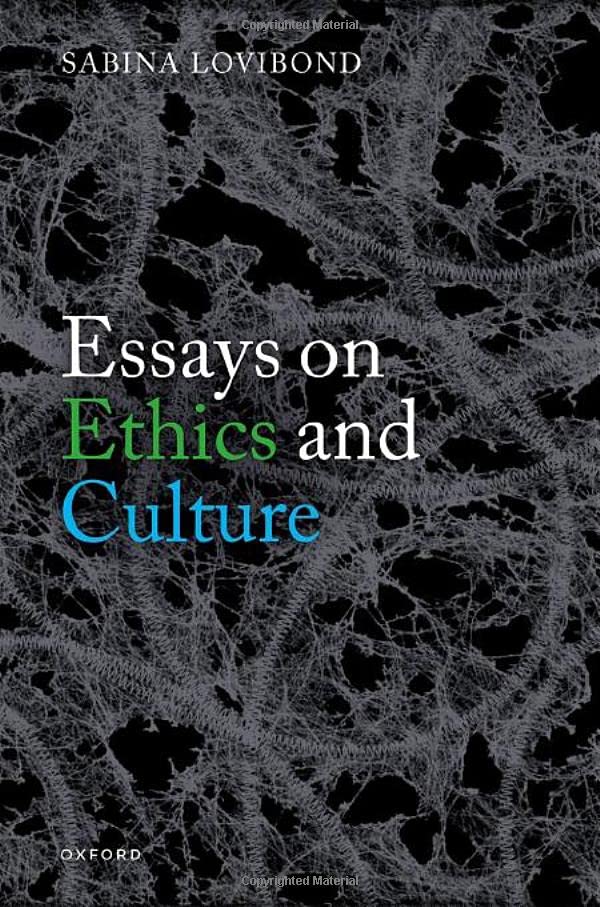Essays on Ethics and Culture
I’ve been kindly invited to contribute a few words about my Essays on Ethics and Culture, forthcoming from Oxford University Press on 15 November 2022. Although by no means exclusively Murdoch-centred, this collection includes four essays dealing directly with the writings of Iris Murdoch and reflecting work of my own from the years 2015-20. The essays in question are 'The Varieties of Attention' (not previously published but presented to a conference at Queen Mary, University of London in 2017), 'The Elusiveness of the Ethical: From Murdoch to Diamond', 'Post-Existentialist Moments: Murdoch and Highsmith', and 'Iris Murdoch and the Quality of Consciousness'.
All these pieces are philosophically motivated, but I hope they will also have something to offer to readers whose interests are primarily literary. Thus, 'Varieties' takes off from Murdoch's well-known claim (following Simone Weil) that we need a 'new vocabulary of attention', and points to the presence in her writings of two somewhat divergent ideals of attentiveness – one tending more towards Weilian asceticism (the claim of the not-self, as against our natural egoism and self-absorption); the other more 'Shakespearian', issuing in an affirmative openness to the human scene in all its moral complexity and ambiguity. This essay discusses The Fire and the Sun (where Murdoch confronts Plato's 'puritanical' attitude to the pleasures of dramatic poetry), but also goes into some detail about two of the novels – The Sacred and Profane Love Machine and Nuns and Soldiers.
'The Elusiveness of the Ethical' was originally part of the Royal Institute of Philosophy's 2018-19 centenary lecture series commemorating the 'four women philosophers' (Anscombe, Foot, Midgley and Murdoch). It examines a view put forward by the American philosopher Cora Diamond (b. 1937), and in which she regards Murdoch as a predecessor and ally. On this view, morality is not a particular department of human life – nor, therefore, should moral philosophy be treated as a department of philosophy with its own particular subject-matter. For Diamond the non-departmental picture is associated with Wittgenstein's Tractatus, where the ethical is said not to be 'in the world'. For Murdoch, on the other hand, it has more to do with her enduring conception of the moral life as going on 'continually' and as something 'concerned with the whole of our being', not 'intermittent or specialized'. But Diamond quite reasonably cites Murdoch as a source for the non-departmental or 'morality everywhere' view, and for insight into the 'ubiquity of the moral quality inherent in consciousness'. My essay explores this idea of the ubiquity of ethics and considers a difficulty which it seems to encounter in the manifest plurality of value – that is, from the (phenomenological, or ordinary-language) evidence that we do in fact take moral value to be one kind of value among others. I follow the lead of both Murdoch and Diamond in treating the fictional representation of states of mind as relevant to this discussion.
Murdoch's first philosophical monograph, Sartre: Romantic Rationalist, seems to me to get less attention than it deserves – possibly because Sartre himself has not been a fashionable subject of study in recent times. This book takes centre stage in 'Post-Existentialist Moments', which developed from a short talk presented at two Murdoch centenary events in 2019 (Oxford and Amiens). Here I focus specifically on Murdoch's observations about Roquentin, the hero of Sartre's 1938 novel Nausea. 'Roquentin is a Platonist by nature', she says, referring to this character's queasy revulsion at the brute fact of the embodied condition. Not at all accidentally, I suggest, this emotional state features in the almost contemporary first novel of crime writer Patricia Highsmith, Strangers on a Train (1950), this time in the person of socially plausible psychopath Charles Bruno. The convergence is non-accidental because, despite the gulf that separates Murdoch and Highsmith in terms of authorial voice and general moral outlook, they are both acting for a brief moment in the early 1950s as mediators to the 'Anglosphere' of a certain existentialist sensibility. I argue, though, that whereas Murdoch's thought will develop towards a 'cool Platonism' shaped by the influence of Weil, the attitude of Roquentin – and of Bruno – can be understood by contrast as expressing an 'angry Platonism': a kind of narcissistic indignation at the contingency of one's presence in the world.
Finally, 'Iris Murdoch and Quality of Consciousness' started out as a contribution to the conference organised by Gary Browning, 'Murdoch on Truth and Love' (Oxford, 2015), and was first published in the associated collection from Palgrave. While the idea of an effort towards the purification of individual consciousness is one of the most celebrated themes in Murdoch's ethics, less thought seems to have been given to the possible continuity of this idea with a different conception of the improvement of consciousness which Murdoch will have encountered in her (pre-Weilian) Marxist phase – namely, the raising of consciousness through a more lucid grasp of the socio-economic totality within which one's existence is located. I turn to her 1970 novel A Fairly Honourable Defeat for insight into the evolution of Murdoch's attitude to the relative merits of reflective moral (or political) consciousness, on one hand, and of simple unreflective moral decency on the other. This novel offers a particularly instructive (and in some ways self-critical) juxtaposition of 'intellectual' and non-'intellectual' characters.
Essays on Ethics and Culture is hardback-only for the time being, but will also be available through Oxford Scholarship Online, where more formal abstracts of the individual essays will be found. There is an Introduction containing more detail about the collection as a whole, which includes a number of pieces on the later philosophy of Wittgenstein, though no attempt is made at any kind of Wittgenstein-Murdoch synthesis.
You can find more details here: https://global.oup.com/academic/product/essays-on-ethics-and-culture-9780192856166?q=sabina%20lovibond&lang=en&cc=eu

